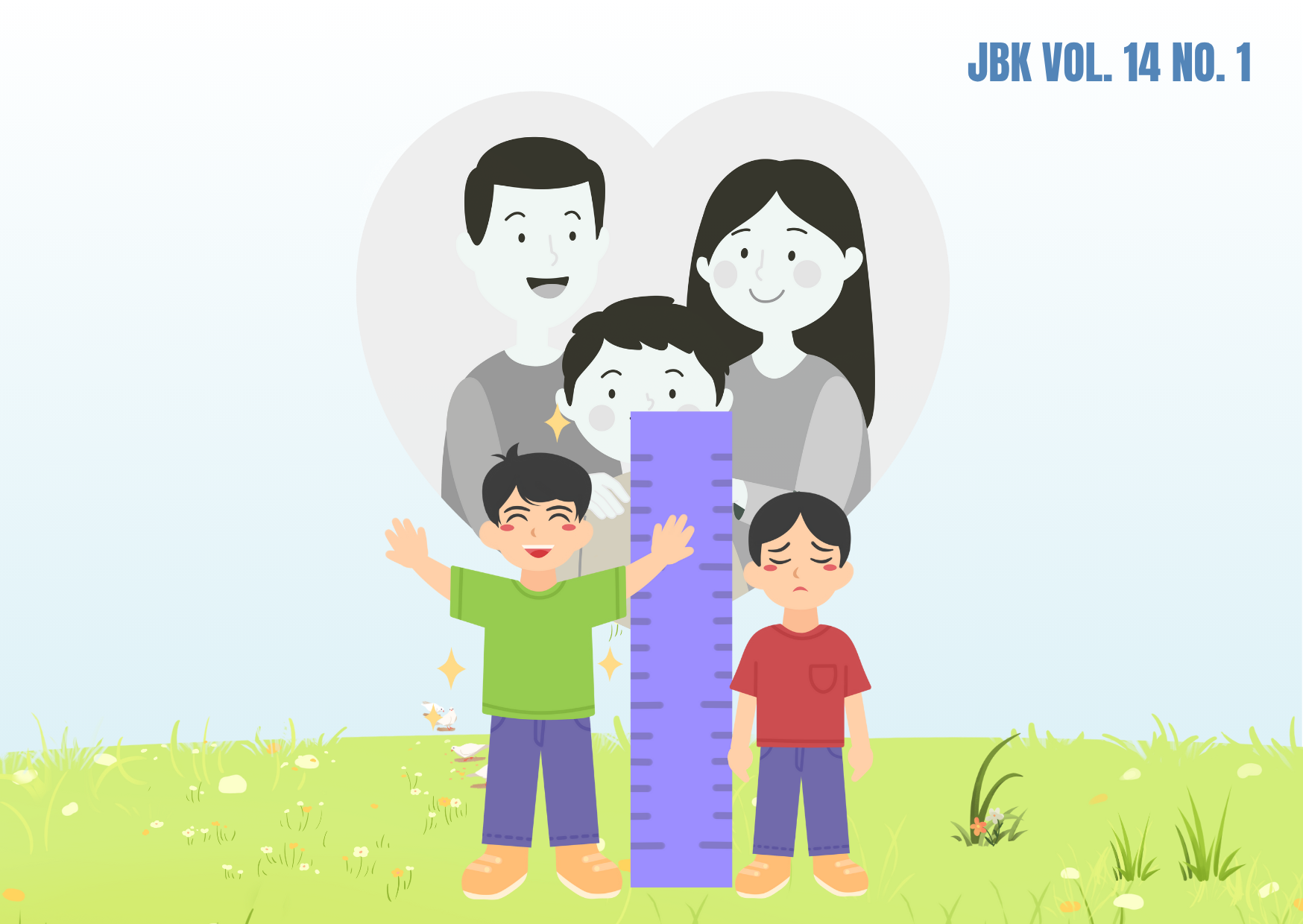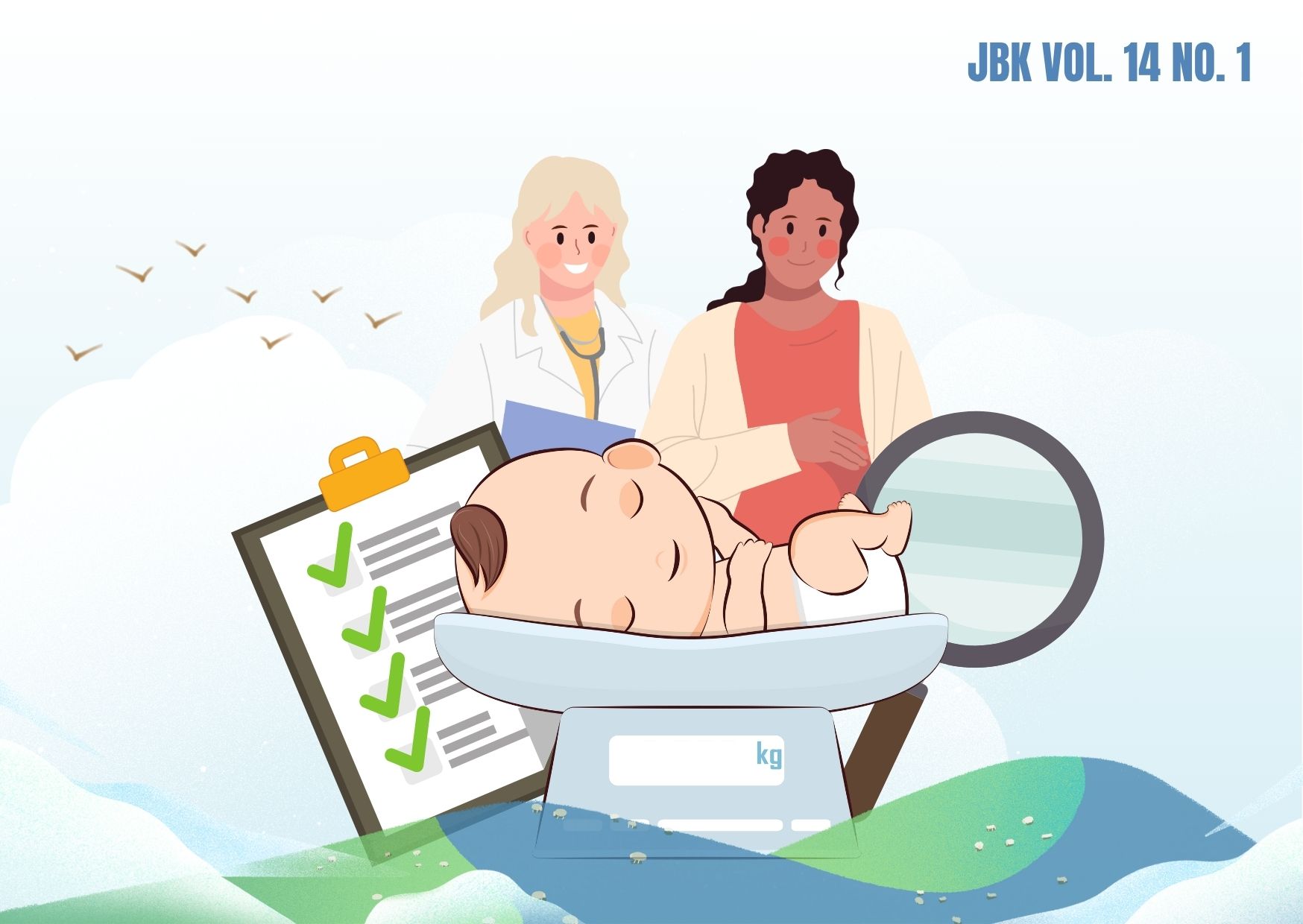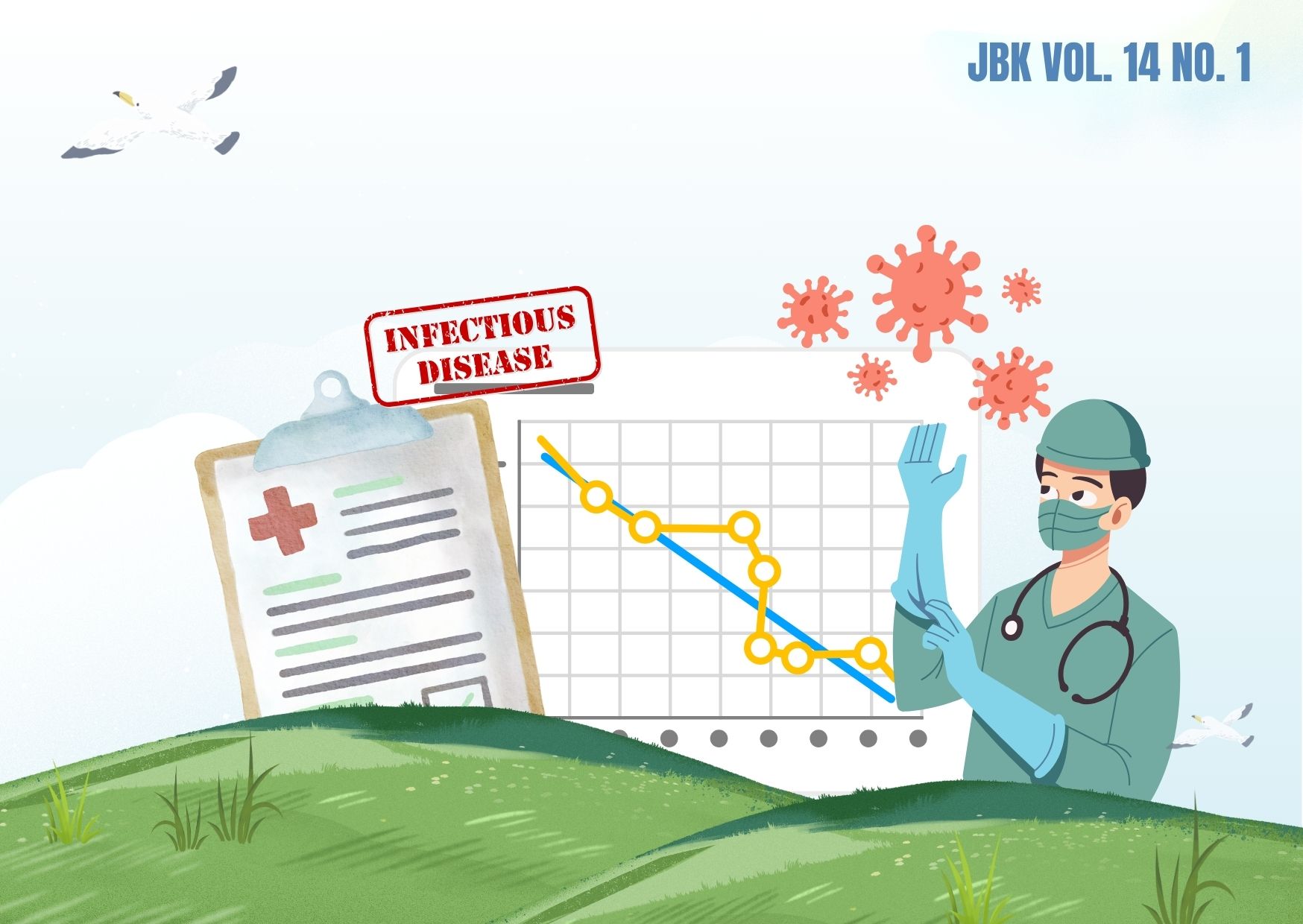DETERMINING THE FACTORS RELATED TO FIRST TIME POSTNATAL BREASTFEEDING
Downloads
Infant Mortality Rate (IMR) is a problem in Indonesia that must be addressed in various aspects. New-borns need more attention in fulfilling their intake for growth and development. The best baby intake for early life after childbirth is exclusive breast milk. The importance of the time when breastfeeding is first given is closely related to the success of the Early Breastfeeding Initiation (EBI). Besides being able to handle the problem of infant intake, EBI is useful in strengthening the relationship between mother and child due to the interactions formed during breastfeeding. The goal to be achieved by researchers is to determine factors related to the time when breastfeeding was first given after birth. This type of research is analytic descriptive using the Spearman correlation test and chi-square statistical tests. The data used are secondary data from the Indonesian Demographic and Health Survey (IDHS) in 2017. The results of the descriptive analysis of the study are that the majority of mothers as respondents gave breastfeeding for the first time immediately at 62.8%. The results of the bivariate analysis of the study are the relationship between maternal parity (p = 0.001 and r = -0.072), infant birth weight (p = 0.03 and r = 0.049), area of residence (p = 0.013) and type of delivery (p = 0.013) p = 0.001) to the time of first breastfeeding.
Adam, A., Alim, A., and Sari, N.P., 2016. Pemberian Inisiasi Menyusu Dini pada Bayi Baru Lahir. Jurnal Kesehatan MANARANG, 2 (2), pp.76–82.
Agustia, E., 2013. Faktor-Faktor yang Mempengaruhi Pemberian ASI Eksklusif pada Bayi Usia 0-6 Bulan. Thesis. Universitas Muhammadiyah Ponorogo.
Bernita, L. M. N., 2017. Klasifikasi Persalinan Normal atau Caesar Menggunakan Algoritma C4.5. Thesis. Universitas Sanata Dharma.
Dewi, N. R., 2010. Hubungan Pola Asuhan Gizi dengan Status Gizi Balita Usia 6-14 Bulan di Wilayah Kerja Puskesmas Tinggimoncong Kab. Gowa. Thesis. Universitas Islam Negeri Alauddin Makassar.
Ekasari, W.U., 2015. Pengaruh Umur Ibu, Paritas, Usia Kehamilan, dan Berat Lahir Bayi terhadap Asfiksia Bayi pada Ibu Pre Eklamsia Berat. Thesis. Universitas Sebelas Maret.
Fauziah, 2009. Faktor-Faktor yang Berhubungan dengan Waktu Menyusui Pertama Kali pada Bayi Baru Lahir di Rumah Sakit Umum Daerah Koja Jakarta. Thesis. Universitas Negeri Syarif Hidayatullah.
Heryanto, E., 2015. Faktor-Faktor yang Berhubungan dengan Pelaksanaan Inisiasi Menyusu Dini. Jurnal Ilmu Kesehatan Aisyah, 1 (2), pp.17–23.
Indonesian Ministry of Health, 2013. Riset Kesehatan Dasar: RISKESDAS. Jakarta.
Indonesian Ministry of Health, 2014. Infodatin: Situasi dan Analisis ASI Eksklusif. Jakarta.
Intermediate Care Facility, 2017. The Demographic and Health Survey (DHS) Program (DHS-7). United Stated: USAID.
Irawati, A., 2010. Inisiasi Menyusu Dini dan Faktor Determinannya pada Anak Balita di Indonesia. Puslitbang Gizi dan Makanan, 33 (1), pp. 1–13.
Issyaputri, A.F., Ansar, J. and Arsyad, D.S., 2012. Faktor yang Berhubungan dengan Ibu Melakukan Inisiasi Menyusu Dini (IMD) di RSIA Siti Fatimah Makassar Tahun 2011. Jurnal MKMI, 6 (2), pp.17–24.
Kaban, N.B., 2017. Inisiasi Menyusu Dini. Jurnal Keluarga Sehat Sejahtera, 15 (2), pp.35–46.
Lestari, R.R., 2018. Faktor-Faktor yang Berhubungan dengan Pemberian ASI Ekslusif pada Ibu. Jurnal Obsesi: Jurnal Pendidikan Anak Usia Dini, 2 (1), pp.131–136.
Mohamad, S., Rattu, A.J.M., and Umboh, J.M.L., 2015. Faktor-faktor yang Berhubungan dengan Pelaksanaan Inisiasi Menyusu Dini oleh Bidan di Rumah Sakit Prof. Dr. Aloei Saboe Kota Gorontalo. Jikmu, 5 (2a), pp.390–396.
Norhana, A., Arifin, S. and Yulidasari, F., 2016. Hubungan Tempat Persalinan dan Jenis Penolong Persalinan dengan Pelaksanaan Inisiasi Menyusu Dini di Puskesmas Martapura. Jurnal Publikasi Kesehatan Masyarakat Indonesia, 3 (2), pp.51–58.
Notoatmodjo, S., 2005. Promosi Kesehatan Teori dan Aplikasi. Jakarta: Rineka Cipta.
Putri, R., Hasanah, N., and Ahsan, 2017. Hubungan Jenis Persalinan terhadap Keberhasilan Inisiasi Menyusu Dini (IMD) di RSUD Bangil Kabupaten Pasuruan. Majalah Kesehatan. 4 (4), pp. 183–192.
Rahardjo, S., 2003. Faktor-Faktor yang Berhubungan dengan Pemberian ASI Satu Jam Pertama. Jurnal Kesehatan Masyarakat Nasional, 1 (1), pp. 11–17.
Trenggonowati, D.L., and Kulsum, 2018. Analisis Faktor Optimalisasi Golden Age Anak Usia Dini. Journal of Industrial Services, 4 (1), pp.48–56.
Ulandari, D., 2018. Faktor-Faktor yang Mempengaruhi Pelaksanaan IMD pada Pasien Pasca Persalinan di BPM Ratna Wilis Palembang. Gaster, 16 (1), pp.64–72.
Copyright©2022 Jurnal Biometrika dan Kependudukan (Journal of Biometrics and Population)
This work is licensed under a Creative Commons Attribution-NonCommercial-ShareAlike 4.0 International License.
1. Copyright of all journal manuscripts is held by the Jurnal Biometrika dan Kependudukan.
2. Formal legal provisions to access digital articles of the electronic journals are subject to the provision of the Creative Commons Attribution-ShareAlike license (CC BY-NC-SA), which means that Jurnal Kesehatan Biometrika dan Kependudukan to keep, transfer media/format, manage in the form of databases, maintain, and publish articles.
3. Published manuscripts both printed and electronic are open access for educational, research, and library purposes. Additionally, the editorial board is not responsible for any violations of copyright law.



































